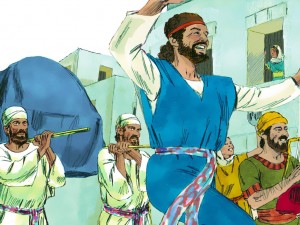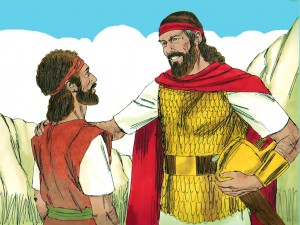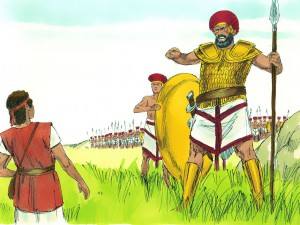Fanfare for the Common Man is a musical work by American composer Aaron Copland. The piece was written in 1942 for the Cincinnati Symphony Orchestra under conductor Eugene Goossens. It was inspired in part by a famous speech made earlier in the same year where vice president Henry A. Wallace proclaimed the dawning of the “Century of the Common Man”. Several alternative versions have been made and fragments of work have appeared in many subsequent US and British cultural productions, such as in the musical scores of movies.
Fanfarria para el hombre común es una obra musical del compositor estadounidense Aaron Copland. La pieza fue escrita en 1942 por la Orquesta Sinfónica de Cincinnati bajo la dirección de Eugene Goossens. Fue inspirado en parte por un famoso discurso pronunciado antes en el mismo año en que el vicepresidente Henry A. Wallace proclamó el amanecer del “Siglo del Hombre Común”. Varias versiones alternativas se han hecho y fragmentos de la obra han aparecido en muchas producciones culturales posteriores estadounidenses y británicos, como en las partituras musicales de películas.
Fanfare per l’uomo comune è un’opera musicale del compositore americano Aaron Copland. Il pezzo è stato scritto nel 1942 per la Cincinnati Symphony Orchestra sotto la direzione di Eugene Goossens. E ‘stato ispirato in parte da un famoso discorso fatto in precedenza, nello stesso anno in cui il vice presidente Henry A. Wallace ha proclamato l’alba del “Secolo l’uomo comune”. Diverse versioni alternative sono state fatte e frammenti di lavoro sono apparsi in molte successive produzioni culturali americane e inglesi, come ad esempio nelle partiture musicali di film.
Source: 2 Samuel 5:1-7:29 2 Samuel 5-7:29(Español) 2 Samuele 5-7:29(Italiano)
2 Samuel 5-7:29
David Becomes King Over Israel
5 All the tribes of Israel came to David at Hebron and said, “We are your own flesh and blood. 2 In the past, while Saul was king over us, you were the one who led Israel on their military campaigns. And the Lord said to you, ‘You will shepherd my people Israel, and you will become their ruler.’”
3 When all the elders of Israel had come to King David at Hebron, the king made a covenant with them at Hebron before the Lord, and they anointed David king over Israel.
4 David was thirty years old when he became king, and he reigned forty years. 5 In Hebron he reigned over Judah seven years and six months, and in Jerusalem he reigned over all Israel and Judah thirty-three years.
David Conquers Jerusalem
6 The king and his men marched to Jerusalem to attack the Jebusites, who lived there. The Jebusites said to David, “You will not get in here; even the blind and the lame can ward you off.” They thought, “David cannot get in here.” 7 Nevertheless, David captured the fortress of Zion—which is the City of David.
8 On that day David had said, “Anyone who conquers the Jebusites will have to use the water shaft to reach those ‘lame and blind’ who are David’s enemies.[a]” That is why they say, “The ‘blind and lame’ will not enter the palace.”
9 David then took up residence in the fortress and called it the City of David. He built up the area around it, from the terraces[b] inward. 10 And he became more and more powerful, because the Lord God Almighty was with him.
11 Now Hiram king of Tyre sent envoys to David, along with cedar logs and carpenters and stonemasons, and they built a palace for David. 12 Then David knew that the Lord had established him as king over Israel and had exalted his kingdom for the sake of his people Israel.
13 After he left Hebron, David took more concubines and wives in Jerusalem, and more sons and daughters were born to him. 14 These are the names of the children born to him there: Shammua, Shobab, Nathan,Solomon, 15 Ibhar, Elishua, Nepheg, Japhia, 16 Elishama, Eliada and Eliphelet.
David Defeats the Philistines
17 When the Philistines heard that David had been anointed king over Israel, they went up in full force to search for him, but David heard about it and went down to the stronghold. 18 Now the Philistines had come and spread out in the Valley of Rephaim; 19 so David inquired of the Lord, “Shall I go and attack the Philistines? Will you deliver them into my hands?”
The Lord answered him, “Go, for I will surely deliver the Philistines into your hands.”
20 So David went to Baal Perazim, and there he defeated them. He said, “As waters break out, the Lord has broken out against my enemies before me.” So that place was called Baal Perazim.[c] 21 The Philistines abandoned their idols there, and David and his men carried them off.
22 Once more the Philistines came up and spread out in the Valley of Rephaim; 23 so David inquired of the Lord, and he answered, “Do not go straight up, but circle around behind them and attack them in front of the poplar trees. 24 As soon as you hear the sound of marching in the tops of the poplar trees, move quickly, because that will mean the Lord has gone out in front of you to strike the Philistine army.” 25 So David did as the Lord commanded him, and he struck down the Philistines all the way from Gibeon[d] to Gezer.
The Ark Brought to Jerusalem
6 David again brought together all the able young men of Israel—thirty thousand. 2 He and all his men went to Baalah[e] in Judah to bring up from there the ark of God, which is called by the Name,[f] the name of the Lord Almighty, who is enthroned between the cherubim on the ark. 3 They set the ark of God on a new cartand brought it from the house of Abinadab, which was on the hill. Uzzah and Ahio, sons of Abinadab, were guiding the new cart 4 with the ark of God on it,[g] and Ahio was walking in front of it. 5 David and all Israel were celebrating with all their might before the Lord, with castanets,[h] harps, lyres, timbrels, sistrums and cymbals.
6 When they came to the threshing floor of Nakon, Uzzah reached out and took hold of the ark of God, because the oxen stumbled. 7 The Lord’s anger burned against Uzzah because of his irreverent act; therefore God struck him down, and he died there beside the ark of God.
8 Then David was angry because the Lord’s wrath had broken out against Uzzah, and to this day that place is called Perez Uzzah.[i]
9 David was afraid of the Lord that day and said, “How can the ark of the Lord ever come to me?” 10 He was not willing to take the ark of the Lord to be with him in the City of David. Instead, he took it to the house of Obed-Edom the Gittite. 11 The ark of the Lord remained in the house of Obed-Edom the Gittite for three months, and the Lord blessed him and his entire household.
12 Now King David was told, “The Lord has blessed the household of Obed-Edom and everything he has, because of the ark of God.” So David went to bring up the ark of God from the house of Obed-Edom to the City of David with rejoicing. 13 When those who were carrying the ark of the Lord had taken six steps, he sacrificed a bull and a fattened calf. 14 Wearing a linen ephod, David was dancing before the Lord with all his might, 15 while he and all Israel were bringing up the ark of the Lord with shouts and the sound of trumpets.
16 As the ark of the Lord was entering the City of David, Michal daughter of Saul watched from a window. And when she saw King David leaping and dancing before the Lord, she despised him in her heart.
17 They brought the ark of the Lord and set it in its place inside the tent that David had pitched for it, and David sacrificed burnt offerings and fellowship offerings before the Lord. 18 After he had finished sacrificingthe burnt offerings and fellowship offerings, he blessed the people in the name of the Lord Almighty. 19 Then he gave a loaf of bread, a cake of dates and a cake of raisins to each person in the whole crowd of Israelites, both men and women. And all the people went to their homes.
20 When David returned home to bless his household, Michal daughter of Saul came out to meet him and said, “How the king of Israel has distinguished himself today, going around half-naked in full view of the slave girls of his servants as any vulgar fellow would!”
21 David said to Michal, “It was before the Lord, who chose me rather than your father or anyone from his house when he appointed me ruler over the Lord’s people Israel—I will celebrate before the Lord. 22 I will become even more undignified than this, and I will be humiliated in my own eyes. But by these slave girls you spoke of, I will be held in honor.”
23 And Michal daughter of Saul had no children to the day of her death.
God’s Promise to David
7 After the king was settled in his palace and the Lord had given him rest from all his enemies around him,2 he said to Nathan the prophet, “Here I am, living in a house of cedar, while the ark of God remains in a tent.”
3 Nathan replied to the king, “Whatever you have in mind, go ahead and do it, for the Lord is with you.”
4 But that night the word of the Lord came to Nathan, saying:
5 “Go and tell my servant David, ‘This is what the Lord says: Are you the one to build me a house to dwell in? 6 I have not dwelt in a house from the day I brought the Israelites up out of Egypt to this day. I have been moving from place to place with a tent as my dwelling. 7 Wherever I have moved with all the Israelites,did I ever say to any of their rulers whom I commanded to shepherd my people Israel, “Why have you not built me a house of cedar?”’
8 “Now then, tell my servant David, ‘This is what the Lord Almighty says: I took you from the pasture, from tending the flock, and appointed you ruler over my people Israel. 9 I have been with you wherever you have gone, and I have cut off all your enemies from before you. Now I will make your name great, like the names of the greatest men on earth. 10 And I will provide a place for my people Israel and will plant them so that they can have a home of their own and no longer be disturbed. Wicked people will not oppress them anymore, as they did at the beginning 11 and have done ever since the time I appointed leaders[j] over my people Israel. I will also give you rest from all your enemies.
“‘The Lord declares to you that the Lord himself will establish a house for you: 12 When your days are over and you rest with your ancestors, I will raise up your offspring to succeed you, your own flesh and blood,and I will establish his kingdom. 13 He is the one who will build a house for my Name, and I will establish the throne of his kingdom forever. 14 I will be his father, and he will be my son. When he does wrong, I will punish him with a rod wielded by men, with floggings inflicted by human hands. 15 But my love will never be taken away from him, as I took it away from Saul, whom I removed from before you. 16 Your house and your kingdom will endure forever before me[k]; your throne will be established forever.’”
17 Nathan reported to David all the words of this entire revelation.
David’s Prayer
18 Then King David went in and sat before the Lord, and he said:
“Who am I, Sovereign Lord, and what is my family, that you have brought me this far? 19 And as if this were not enough in your sight, Sovereign Lord, you have also spoken about the future of the house of your servant—and this decree, Sovereign Lord, is for a mere human![l]
20 “What more can David say to you? For you know your servant, Sovereign Lord. 21 For the sake of your word and according to your will, you have done this great thing and made it known to your servant.
22 “How great you are, Sovereign Lord! There is no one like you, and there is no God but you, as we have heard with our own ears. 23 And who is like your people Israel—the one nation on earth that God went out to redeem as a people for himself, and to make a name for himself, and to perform great and awesome wonders by driving out nations and their gods from before your people, whom you redeemed from Egypt?[m] 24 You have established your people Israel as your very own forever, and you, Lord, have become their God.
25 “And now, Lord God, keep forever the promise you have made concerning your servant and his house. Do as you promised, 26 so that your name will be great forever. Then people will say, ‘The Lord Almighty is God over Israel!’ And the house of your servant David will be established in your sight.
27 “Lord Almighty, God of Israel, you have revealed this to your servant, saying, ‘I will build a house for you.’ So your servant has found courage to pray this prayer to you. 28 Sovereign Lord, you are God! Your covenant is trustworthy, and you have promised these good things to your servant. 29 Now be pleased to bless the house of your servant, that it may continue forever in your sight; for you, Sovereign Lord, have spoken, and with your blessing the house of your servant will be blessed forever.”



